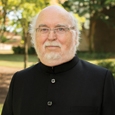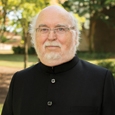Editor’s Note: We asked various people to tell us their favorite memories from the Midwest Clinic. You will see many of the responses starting on page 12; we are grateful to all who shared their stories so far. We felt that this essay from composer David Holsinger captures perfectly the magic of Midwest, as he had the opportunity to thank someone who changed the course of his life. There will be more coverage of the 70th Anniversary Midwest in our December issue.
My most memorable experience from the Midwest Clinic had its roots in an event that occurred in my college years and culminated in one 15-minute conversation in the exhibit area of the Hilton Hotel in 1994.
Like a number of small colleges in the Midwest, the Central Methodist Band always had a spring tour, usually consisting of seven days of travel with three concerts a day at schools or churches. In the fall of 1965, our band director announced that we would have a guest composer traveling with us on the upcoming spring tour. His name was Vaclav Nehlybel, and he would be conducting two of his recent works, Trittico and Chorale.
Two days before tour, Vaclav Nehlybel walked into our band hall, stepped on the podium, lifted his arms . . . and as I watched that first slashing downbeat of the baton, I had my first realization of how personal music could be. In that one electrifying instant, I saw brutality, beauty, angst, anguish, joy, triumph, sorrow, exhilaration, devastation, despair, hope, faith – all in the eyes of one man conducting his music. At the close of the final tour concert, I was overcome by the transformation I knew was happening in my life. I had come face to face with my future. I wanted to be a composer.
Fast forward to 1994. Standing in the lobby of the Chicago Hilton, visiting with my friend, Tom Stidham from the University of Kansas. Tom interrupts our conversation with “There he goes…” I turned to see the flash of white hair disappear around a corner and ask,
“Who?”
“Nehlybel.”
My first thought was to run through the crowd, throwing people helter skelter, hoping to have one small conversation with this man who 30 years before changed the entire path of my life. But he was gone.
That night, I lay in bed, quite aggravated with myself, knowing that since I am stuck in exhibits all day, there is little chance that I would get to see or meet with him.
The following morning, I am in the TRN Booth, at the far end of Aisle 3, with my publisher, the late Pete Wiley, preparing for the opening bell. I volunteered to step away and get us a couple of cups of coffee. I stepped into the aisle and saw Vaclav Nehlybel standing at the other end of that exhibitor’s corridor. People zoomed to and fro around him. It was like one of those surrealistic movies where everyone else is a blur, and he stands there, the only clear and visually dimensional person, breathlessly waiting for someone to pull him from the barrage of swarming motion surrounding him.
I’m sure I said a quick “Thank you Lord” under my breath as I hurried up to him. I fumbled through some inconsequential facts about where we met, and how much I appreciated his music, how much of an inspiration he had been, and then, almost as an afterthought, I began to introduce myself. He interrupted my babbling, saying, “I know you. You are Holsinger, the famous composer.”
I’m not sure what happened in that split second.There’s a good possibility that I levitated at least four inches off the floor. He proceeded to tell me about the teacher in his life who had fired his young passion to composition. Then with an off-handed admonition to “pass what we do on,” he turned and walked off, swallowed by a suddenly awakened crowd of admirers at once aware that he was standing there in their midst.
I never saw him again that week. Within a year or so, he had passed away. I know that I was not the only person changed and challenged by this incredible personality. But I do know, that those heady days in 1966, and that 15 minutes in the exhibit hall of the Midwest Clinic have shaped, to a great degree, my life long desire and responsibility to pass it on.






